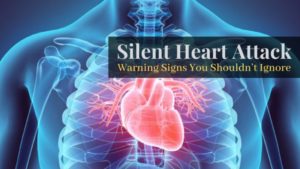
What Is A Silent Heart Attack?
A heart attack doesn’t always lead to chronic pain in the chest or pressure so intense that it can cause a person to collapse to the floor. Sometimes it can be a silent heart attack as well. According to experts, some people do experience a much less dramatic version of the symptoms of a heart attack. Confused? okay, let’s understand it this way. A heart attack happens when the arteries that carry blood to the heart get blocked. This leads to the deprivation of oxygen and nutrients in the heart muscle. When there are no strong symptoms such as indigestion, a sprained or strained muscle, fatigue, etc, of the condition, it is known as ‘silent heart attack’.
Pressure, Fullness, Or Discomfort
Chest pain is one of the most common symptoms of heart attack, but what if there is no pain or discomfort in the chest? Sometimes, you may feel pressure, squeezing, or fullness near the chest area. This is not common for a heart attack but can be one of the uncommon signs of a silent heart attack.
Other Body Parts Can Also Give You Signs
A heart attack doesn’t just affect your heart, your other body parts can also get affected by a heart attack and may also show up symptoms that can help you to understand if you are having a blockage in your heart’s artery or not. Some of you may experience pain or discomfort in these body parts — arms, back, neck, jaw, stomach, etc.
Nausea And Cold Sweats
If you ever notice unexplained cold sweats just after getting up from sleep, remember — it is not normal. Waking up in cold sweats, sudden nausea or vomiting can be some of the signs of a silent heart attack. However, you may feel that these are also signs that you are suffering from cold or flu but do not wait for long if you experience these signs without cold or cough. Get checked by a physician immediately.
Difficulty In Breathing And Extreme Fatigue
Its not always that you will feel a chronic pain in your heart or back, but also a serious condition like difficulty in breathing can mean that you are having a silent heart attack. If you are having difficulty with normal daily tasks that weren’t previously difficult for you, such as making the bed or walking up the stairs, make sure you get yourself checked by your physician.




 Driving Naari Programme launched in Chandigarh
Driving Naari Programme launched in Chandigarh






























